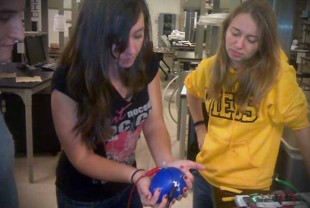BY LAUREN VESTEWIG GRAY
Special to the Rice News
A Rice University senior capstone project to help infants with sleep apnea took top honors in the second annual National Undergraduate Global Health Technologies Design Competition hosted by Rice 360°: Institute for Global Health Technologies and the Beyond Traditional Borders initiative. Other winning projects were a modular infant incubator (Columbia University) and ways to address respiratory disease (Marquette University) and a protein deficiency in malaria-prone regions (Johns Hopkins).

Team Breath Alert members Jordan Schermerhorn, left, and Andrea Ulrich test the infant apnea monitor at the Oshman Engineering Design Kitchen. The team won the top prize at this year's National Undergraduate Global Health Technologies Design Competition.
Eighty-four students from universities nationwide gathered at the BioScience Research Collaborative last Friday for the competition.
“This is one of our favorite events,” said Rebecca Richards-Kortum, the Stanley C. Moore Professor of Bioengineering and director of Rice 360°. “We love to learn about the exciting technologies that engineering students across the country are designing to overcome global health challenges. This year we had more than twice as many teams compete as we did last year. This momentum reflects a growing interest among undergraduates in using their skills to be part of the solution to global health challenges, and we are glad to be a part of it.”
Twenty-four teams from 15 universities, including three from Rice, presented their designs and delivered short oral presentations that defined a global health problem and described a technology they had designed to solve it. Teams also presented posters on their designs.
Teams were judged on how well they articulated the global health challenges they sought to solve, the technical and social feasibility of their designs, their descriptions of the current status of their solutions and their plans to overcome remaining challenges. Judges included engineering and business faculty members from across the country, engineers from industry, physicians working in global health, technology transfer professionals and representatives from the U.S. Agency for International Development, NASA and Becton Dickinson.
“It is incredibly inspiring to learn about the work that students are doing to improve global health,” said judge Leonard Yowell ’02, a materials research engineer at NASA Johnson Space Center. “I can certainly see some of these technologies being used in the field and having a positive impact in the lives of the world’s poor.”
Student teams presented health technologies they had designed in response to a variety of global health challenges, including common causes of neonatal mortality, safe labor and delivery practices, fistulas, neglected tropical diseases and anemia.
Four teams won prizes:
Breath Alert from Rice University took first place for its Babalung Apnea Monitor, which alerts nurses when a baby is suffering from apnea. Team members were Jordan Schermerhorn, Rachel Alexander, Rachel Gilbert, Bridget Ugoh and Andrea Ulrich. They were advised by Rice faculty members Maria Oden, professor in the practice of engineering education, and Gary Woods, professor in the practice of computer technology.
- Human Powered Nebulizer from Marquette University won second place for its hand-crank nebulizer to enable patients to inhale aerosolized medication for respiratory disease. Team members were Katelynn Kramer, Andrew Weingart, Sarah Schmeidel, Brian Laning, Ellie Hawkinson and Chris Hallberg. They were advised by Lars Olson, an associate professor of biomedical engineering at Marquette.
- G6PDesign from Johns Hopkins University earned third-place honors for its point-of-care diagnostic device to detect G6PD deficiency, a condition common in malaria-prone regions. G6PDesign team members were Rohit Dasgupta, Vikram Rajan, Richard Powers, Uma Mohan, Joy Ukaigwe, Hannah Jiam, Ming Kang, Jordan Mandel, Renu Kondragunta and Pranay Rao. They were advised by Anne Le, assistant professor at The Johns Hopkins School of Medicine.
- IncuVive from Columbia University won fourth place for its modular incubator system to combat infant hypothermia in low-resource settings. Advised by Aaron Kyle, a lecturer in biomedical engineering at Columbia, team members were Kiet Vo, Min Ye Shen, Annabelle Chu Yan Fui, Indrias Bekerie and Leeanna Hyacinth.
In addition, three teams won People’s Choice Awards. A team from Johns Hopkins University won for its presentation on “Improving Neonatal Resuscitation in the Developing World.” Teams vPRIME from the University of Pennsylvania and IV Raid from Rice University won for their posters.
After the presentations, Johns Hopkins faculty members Harshad Sanghvi of Jhpiego and Soumya Acharya of the Center for Bioengineering Innovation and Design delivered a keynote address on the potential of global health technologies to solve some of the world’s most critical global health challenges and promising new technologies in development.
— Lauren Vestewig Gray is the executive director of Rice 360°.


Leave a Reply